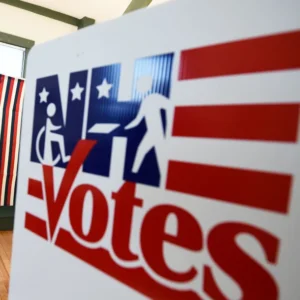Claims that new voter registration requirements would disenfranchise hundreds of thousands of voters — and married women in particular — aren’t just factually untrue; they’re voter suppression. That’s the view of some New Hampshire House Republicans, and they’ve filed a complaint with Attorney General John Formella requesting a review.
In their letter to the attorney general, Republicans on the House Election Law Committee — led by chair Rep. Ross Berry (R-Weare) — quoted a statement made by Joan Dargie, president of the New Hampshire City and Town Clerks Association and released by U.S. Rep. Maggie Goodlander.
“New Hampshire recently enacted a bill that is very similar to the Save Act, and it has already disenfranchised voters in New Hampshire from voting in their town elections. We estimate between 10 and 50 percent of voters will be turned away from voting on election day,” Dargie said.
That statement was part of a press release from Goodlander explaining her vote against the SAVE Act, a federal law requiring people to prove their citizenship when they register to vote in federal elections. Goodlander and her fellow Democrats in Congress have been claiming the law would disenfranchise married women.
“These women would not be able to use their birth certificates to prove their citizenship under the SAVE Act. And, if they do not have a passport, which roughly 44.5 percent of Granite Staters do not, they would not be able to register to vote at all under the SAVE Act,” Goodlander said in a statement.
The claim that a passport is required to register to vote under the SAVE Act is factually incorrect. It requires the same documentation used when getting a REAL ID-compliant driver’s license, such as a birth certificate and marriage license.
New Hampshire passed a similar law at the state level, HB1569, last year.
In the letter, the Election Law Committee members point out “the documentation referenced in Ms. Dargie’s statement applies only to new registrants, not to voters already on the checklist.”
As for her claim that up to half of all would-be voters might be turned away — about 300,000 people in a typical midterm, “Same-day registrants typically make up about 10 percent of the electorate, which makes the claim that ’10 to 50 percent of voters will be turned away’ mathematically impossible unless the Clerks Association is mistakenly instructing election officials to apply registration requirements to already registered voters.
“If that is the case, such guidance would be in direct conflict with state law and could lead to the unlawful denial of ballots to eligible voters who are already registered.”
The misleading messaging from national Democrats targeting married women and the mathematically impossible messaging from the City and Town Clerks Association add up to voter suppression, Republicans say. They’re asking the state Department of Justice to review policies among town clerks to ensure they are applying the law correctly, and make sure the clerks aren’t “spreading misleading information” about the requirements to vote.
In an interview with NHJournal, Dargie insisted she did not mean to mislead anyone.
“Maggie Goodlander contacted me and asked for a few sentences regarding the new law,” Dargie said.
Asked about the 10 to 50 percent disenfranchisement number, Dargie appeared to confirm the claim that she did not understand the math.
“In Nashua last November, there were 7,000 same-day voter registrations, and 3,500 filled out affidavits (rather than provide documentation). That’s where I got the 50 percent figure.
“And in my town of Milford, we had 20 people turned away in March because they didn’t have the documentation to register, and two of the 20 did not come back with their documentation. That’s where I get the 10 percent.”
The vast majority of Granite Staters who vote are already registered and will only need a photo ID.
Dargie acknowledged that a birth certificate and a marriage license would be enough for most married people who changed their last names, but she pushed back on the idea that the process would be simple for everyone.
“Some people have been married multiple times. Some people haven’t accessed their birth certificates in years, maybe decades, and they may have been born out of state. And in some of the college towns, some students won’t bother to get their birth certificates.”
And she said sometimes a minor document issue — someone whose birth certificate says “Katherine” but whose marriage certificate says “Kathy” could be enough to prevent people from voting.
Dargie added she supported the goal of the new New Hampshire law and the SAVE Act. “I’m not saying don’t prove citizenship.”
Asked how New Hampshire can accomplish that goal without requiring people to prove who they are and where they were born, Dargie paused.
“There should be some sort of affidavit or waiver,” she said. “There has to be another way.”





